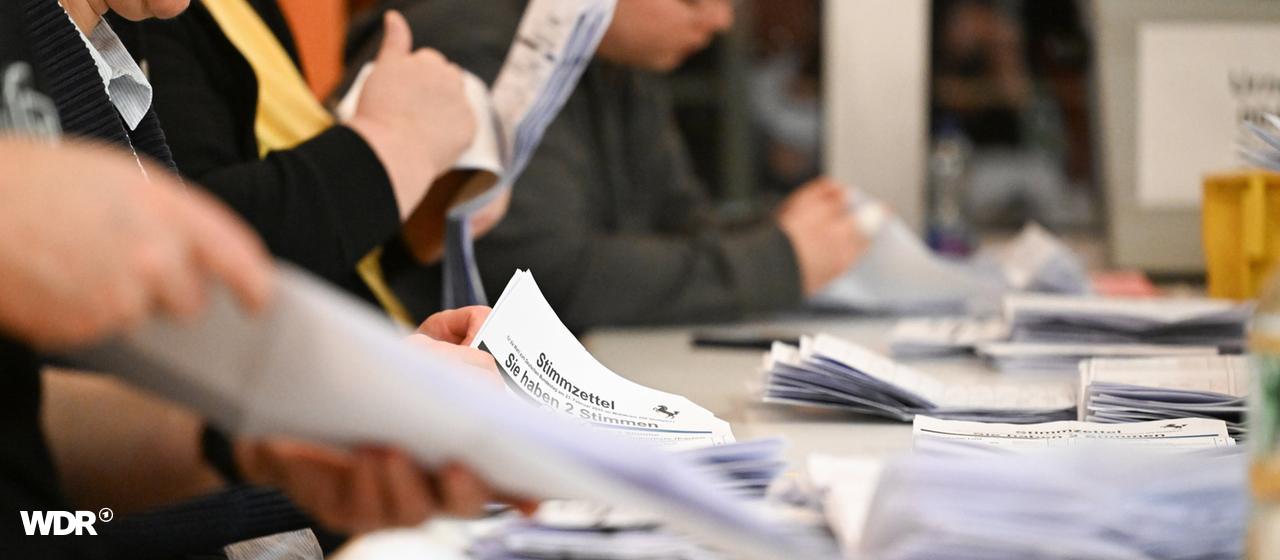
This Sunday, mayors, district administrators, and city and municipal councils were elected for five years in North Rhine-Westphalia. The polling stations are closed. The first forecast is in. The NRW local elections were also seen as a test of the mood for federal politics.
13.7 million eligible voters were called to participate in the local elections in North Rhine-Westphalia on Sunday. Among those elected were mayors, district administrators, and members of district councils, as well as city and municipal councils. Polling stations closed at 6 p.m. Statewide projections are expected starting at 7 p.m.
Forecast: CDU strongest force, AfD gains ground
According to Infratest dimap's forecast for the independent cities and district councils, the CDU is at 34 percent nationwide (down 0.3 percentage points compared to the last local elections in 2020). The SPD is at 22.5 percent (down 1.8 percent). For both parties, this is the worst local election result since the founding of the state of North Rhine-Westphalia in 1946. At the same time, however, the Christian Democrats and the Social Democrats are performing significantly better than current national polls.
According to the forecast, the Greens are suffering severe losses, reaching only 11.5 percent (down 8.5 percent). The AfD is gaining significantly, reaching 16.5 percent (up 11.4 percent). The FDP is down 3.5 percent (down 2.1 percent). The Left Party is gaining slightly, reaching 5.5 percent (up 1.7 percent). Others: 6.5 percent.
Voter turnout is forecast to rise to 58.5 percent (2020: 51.9 percent). This would be the best turnout in NRW local elections since 1994, when the federal election took place at the same time.
Runoff elections on September 28
The local elections in Germany's most populous state were also seen as a test of the political mood. They were the first major election since Chancellor Friedrich Merz's (CDU) coalition government took office in May. Merz and other leading representatives of the federal parties made several appearances during the election campaign in NRW, as did North Rhine-Westphalia's Minister-President Hendrik Wüst (CDU).
The mayoral elections in major cities were eagerly awaited. In cities, municipalities, and districts where no candidate achieved an absolute majority in today's election for mayors and district administrators, a runoff election will take place in two weeks between the two candidates with the most votes.
Who has so far appointed the most mayors
NRW has 396 cities and municipalities. According to its municipal association, the CDU currently has around 170 mayors across the state. The SPD has 80 mayors and 13 mayors. Some mayors are also nominated and supported by multiple parties or voter initiatives. Many mayors are also independent.
The Green Party, according to their own figures, has 16 mayors. The FDP has three mayors. The AfD has not yet captured a single city hall in North Rhine-Westphalia. The Left Party also has no municipal leaders.
No five percent hurdle
There is no five percent threshold in local parliaments. In the Ruhr Regional Association (RVR), the association assembly, known as the Ruhr Parliament, is also elected. In many cities and municipalities, integration councils are also elected. In total, eligible voters in North Rhine-Westphalia can award approximately 20,000 municipal offices and mandates across the state.
Eligible to vote in local elections in North Rhine-Westphalia are Germans and citizens of other EU member states who are at least 16 years old on election day. In recent weeks, numerous eligible voters have already cast their votes by postal ballot.

